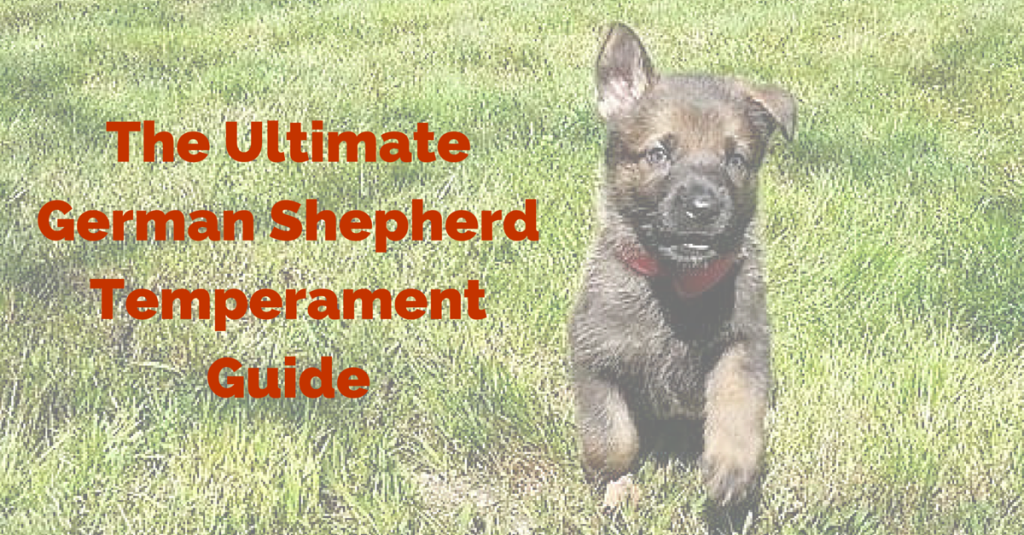Do you keep coming across the same boring, unscientific descriptions of German Shepherd temperament on every dog information website you go to?
Frustrating, isn't it?
These generic 'personality trait' lists leave a lot to be desired when you're looking to buy a German Shepherd and want to learn about their behavior.
But I have good news for you:
More...
You can finally stop searching for answers because you've come to the right place.
The Ultimate German Shepherd Temperament Guide

It's an in-depth report featuring easy-to-understand examples from real life that will help you gain a clear understanding of German Shepherd temperament, personality, and behavior.
Before getting into specific examples, it's important to have a broad knowledge of what's fact and what's fiction in regard to the public's perception of German Shepherd temperament and personality.
The Difference Between Temperament and Personality In Dogs
Temperament- the underlying genetic characteristics of a dog's personality. Temperament is behavioral characteristics that have a basis in the dog's genetic code.
Personality- how you describe the dog's overall demeanor
Before we read further, consider this quote:
The most striking features of the correctly bred German Shepherd are firmness of nerves, attentiveness, unshockability, tractability, watchfulness, reliability and incorruptibility together with courage, fighting tenacity and hardness.
Captain Max von Stephanitz, Father of the German Shepherd Dog
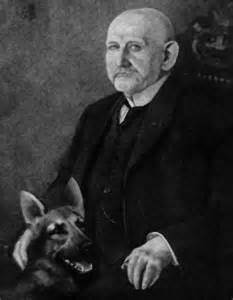
Max is talking about personality traits, not temperament descriptions.
Many people confuse the two so if you do too, it's okay. Let's clear up these differences together so you can get a clear understanding of German Shepherd temperament and personality, and what it means for your family.
Note von Stephanitz's inclusion of the word “correctly bred” into this description. More and more, uneducated breeders are producing dogs that aren't considered “well bred” by the historical German Shepherd standard. This is a big reason German Shepherd temperament has gotten a bad rap over the last decade.
This article will give you a clear understanding of what it means for a German Shepherd to have 'sound temperament.'
After reading it, you'll be able to use this knowledge to help choose the right breeder and let is serve as a foundation for training your dog throughout it's life.
3 German Shepherd Temperament Terms You Need To Know
Nerves – the natural ability to adapt to a given situation.
Drives- the instinctual motivations behind a behavior or action
Thresholds- the moment a drive is either entered or exited.
This article will explain what these terms mean in greater detail, so you can apply the knowledge to your given situation.
But first:
The Problem With Most German Shepherd Fact Resources
Temperament is a word you hear a lot in the dog world. And if you're like most people researching the German Shepherds, you're probably wondering what it means...

First off, it's NOT:
- Loyalty
- Intelligence
- Focus
- Obedience
- Or any similar "descriptive characteristics
This is a common misconception in the German Shepherd world. And it's one of the biggest reasons dog owners have trouble understanding their dog's behavior.
The confusion between temperament and personality often leads owners to mis-diagnose their dog's behavior, which can lead to frustration in training.
If you're in this boat, don't worry. It's not your fault.
Here's why:
Most articles online about dog temperament are flawed because they're not based on science.
Instead, the articles that abundant online are based on the experiences and opinions of whoever's written it. This is a dangerous way to write because it becomes impossible for non-dog experts to distinguish between what's universally true, and what's an opinion based on the writer's experience.
If you take anything away from this article, let it be this:
The temperament of German Shepherds can vary greatly from dog to dog. For this reason, it's important to remember that this article is written from a scientific perspective. This way, you'll be able to know the basics of what's universally true, so you can apply the principals to you and your dog's specific life situation.
Factors that can influence the GSD's temperament and personality
- Personal experience
- Memories
- Conditioning
- Specific places in time
- Environment
- Handler cues
Do you want to know why German Shepherds shouldn't be labeled as 'problem dogs' or 'aggressive dogs'?
If so, keep reading...
In order to understand the German Shepherd's personality, you need to first have a firm grip on the three elements of temperament (nerves, drives, and thresholds). It's important to consider how genetics affect these elements too.
So let's get started...
Do genetics affect the German Shepherd's Temperament?
The short answer is yes.
Temperament is a combination between the dog's DNA and environmental factors.
An underlying baseline for a dog’s temperament is rooted in its genes. All dogs come genetically predisposed to certain behavioral traits. And this is even more-so the case with working breeds like the German Shepherd because they've been bred to do specific tasks over the course of 100+ years.

Note that “genetic predisposition” is much different than being “genetically pre-determined.”
Pre-determined would mean the dog acts a certain way no matter what, while pre-disposed means the dog is more than likely to act a certain way (as long as they’re raised normally).
Even though no dog is exactly the same, there are certain behavioral traits that are seen more often than not in the German Shepherd.
For example, Shepherds of all kinds are predisposed to have herding instincts. They have these instincts because that's what the breeds that they were developed from were predominantly herding dogs .
On the same token, gun dog breeds are predisposed to have 'pointing' instincts, etc.
Why do German Shepherds act a certain way?
Because of this 'predisposition.'
Whether trained or not, these “predisposed traits” are naturally evident within their respective breeds.
You see it all the time with German Shepherd puppies trying to 'herd' their new owner, or gun dog puppies 'pointing' when they see or hear game (birds, ducks, etc) for the the first time. The behavior occurs even though their mother never taught them these behaviors.
Over the years, breeders have chosen dogs for breeding that naturally took to the jobs they were bred to do. For example, if one herding dog more naturally took to herding, it would be chosen for breeding over a herding dog who didn't take to the job as naturally.
German Shepherds act a certain way because of their predisposition to do so, but the behaviors can be enhanced or modified through training exercises too.
At which stage does a German Shepherd's Temperament begin to take shape?
Temperament is also a function of environment, meaning that environmental factors matter just as much (more in some cases, less in others) as genetic ones. Here are some examples of environmental factors:
- Family members
- Other pets
- Geographic location
- Breeder
- Pedigree
- Experience as a puppy
As soon as puppies are conceived, their development is impacted by the environment. But even beforehand, the environment a mother is in while pregnant plays a big role in the puppy's future temperament.
As a result, it’s CRITICAL for breeders to keep their pregnant dogs physically, emotionally, and mentally fulfilled.

Stressed-out mothers who are unhappy during pregnancy are much more likely to birth unhealthy puppies (both physically and mentally). So start on a solid genetic footing, a breeder must offer an enriching environment for the mother.
This is so crucial to a puppy’s future temperament, Hayes Haus developed a unique Foster Breeding Program to ensure all pregnant mothers are kept in the type of environments mentioned above.
We think it’s a big reason we’ve had so much success breeding German Shepherds with correct nerves, drives, and thresholds. If you want to learn more about our breeding program, you can read this page.
Nerves; The Most Important Part of German Shepherd Temperament
A common misconception of the German Shepherd (and all dog breeds in general) is that 'drive' is the most important temperament factor.
This couldn't be further from the truth.
Nerves are the most critical factor when it comes to German Shepherd temperament. This section will explain why.
'Nerve' describes a dog’s underlying ability to adapt to any given scenario. As canines, dogs are some of the most adaptable animals on the planet. This holds true both individually and through generations.
The Difference Between A Strong-Nerved Dog and Weak-Nerved Dog
Dogs with strong or 'solid' nerves adapt easily to new places, people, and things.
Dogs with 'weak nerves' generally show over-the-top fear/aggressive responses to non-threatening stimulus.
Nerve strength is paramount in dogs of all breeds. It's big part of what gives them the ability to become a happy member of your family.
The ability to take in and adapt to a brand new situation and display the normal spectrum of behavioral and character traits no matter the environment or outside stimulus speaks to the strength of a dogs nerves.
Dogs with strong nerves are easy to integrate into our daily lives as loving members of out families
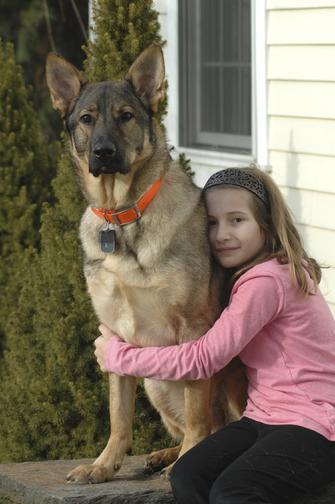
On the other hand, dogs who need drawn-out adjustment periods when presented with new environments are hard to integrate them into our daily lives. These are major signs of a weak-nerved dog.
Dogs with weak nerves are easily traumatized and take a long time (hours or days) to recover from any given stimulus, environment or scenario. If the stimulus is negative enough, sometimes these dogs don't recover at all on their own. At this point, they require reconditioning.
It's important for dogs that stress in such an extreme manner to get as much quality training and conditioning as possible in order for them to become safe members of society. There is nothing potentially scarier than a weak-nerved dog.
How Does A Owning A Dog With Weak Nerves Affect Your Life?
If a weak-nerved dog has a negative experience, there will be noticeable effects on the dog’s attitude towards that stimulus, environment or scenario in the future.
For example:
Your puppy is walking down the street with you when a Mac Truck drives by and blares it's horn.
The puppy gets scared (it's a puppy after all).
The Long-Term Affect This Experience Could Have On A Weak-Nerved Dog
The puppy will continually show fear uncharacteristic to a dog with sound nerves when similar environments to this negative experience.
This will go on for a significant length of time (perhaps always) afterword, which presents challenges when you bring your dog to load environments or simply try to take her for a walk down the same street.
Training Options For This Weak-Nerved Dog
The dog can be conditioned to respond more positively to any given scenario it was previously acting fearful of or aggressive in. But the big issue with this type of 'reconditioning' is that the moment the "practiced situation" changes, the dog often reverts back to it's initial fear.
The new, trained behavior will only be present when the real-life scenario remains similar to the training.
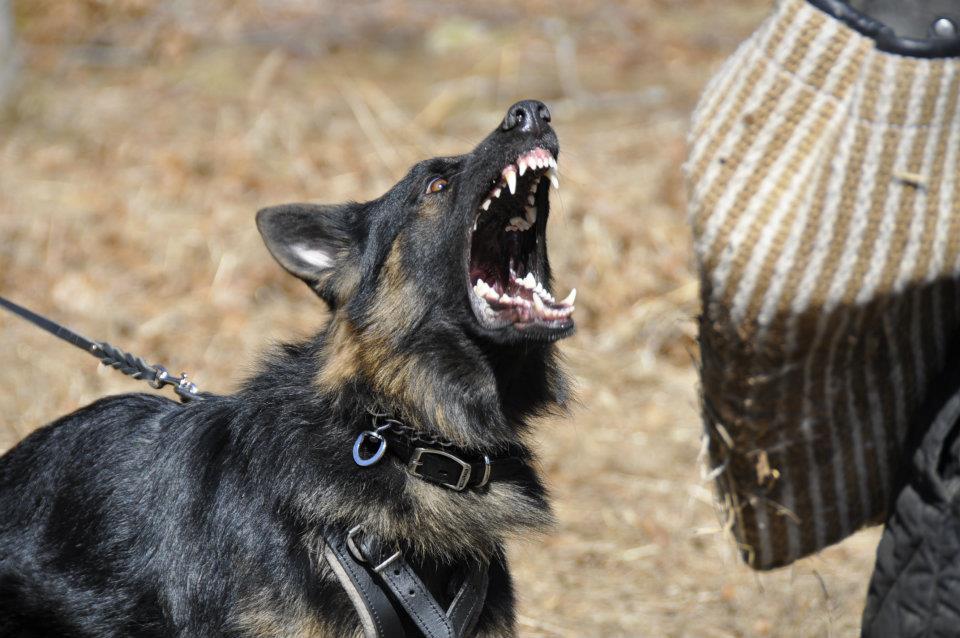
Potential Cons of Too Strong of Nerves
Strong-nerved or 'Bomb proof' dogs can get themselves into trouble as too.
Let's take the truck example above.
If a dog has no fear of a Mack truck traveling down your street straight toward him, his 'strong nerves' no longer seem so attractive. The dog is showing strong nerve strength, but also lacks common sense and intelligence.
Dogs must to be able to discern what is going to harm them and react appropriately.
Good german shepherd temperament must air on the side of strong nerves. It is a main characteristic of the breed's temperament.
Why Strong Nerves are The Most Important Factor of German Shepherd Breeding
Strong nerve should be the cornerstone of all dog breeding because it makes for safer dogs. Safe dogs are able to be around humans more often, and the ability to co-exist and adapt is the canine’s most important attribute.
Dogs that overreact to outside stimulus and/or fail to recover in a reasonable amount of time (with little help from a trainer) are potentially dangerous because overreaction unpredictable in nature.
To breed dogs with weak nerves is ALWAYS a mistake. They'll produce offspring with undesirable traits and the cycle will continue.
And this cycle will get worse and worse by generation.
Whoever you pick when you buy your German Shepherd puppy, it is important that the breeder has a solid understanding of German Shepherd temperament and weighs it heavily when making breeding decisions.
Drives; and why “Should I Get A High Drive Dog” is a Misinformed Question
If you've wondered this question to yourself, it's okay. Not your fault at all.
When searching around the internet, 'drive' is often touted as the most important aspect of dog breeding. It happens even more often with working dogs like the German Shepherd, Belgian Malinois, etc
But:
The notion that producing "high drive" is the most important part of German Shepherd Breeding couldn't be further from the truth.
The definition of drive is the dog's desire to perform a specific task or display a specific behavior. The concept is simple at it's core, but often becomes misinterpreted when people try to over-complicate it.
You even see drive used as a reason why people don't want to buy a certain breed as a pet. Though false, it's a common belief that dog's with higher drive are more difficult to train and own.
They're neither more nor less difficult, they just need to be considered when making training decisions.
What affects a German Shepherd's drive?
- Environment
- Genetics
- Training
- Competing drives
- Nerve
These can all have an impact on any given drive at any given time.
Drive intensity is the level of desire a dog has to do a certain thing. And just like with humans, drive intensity is not set in stone.
A dog can want to play with a tug toy when you're a home but not when at the dog park. This happens because the dog's social drive and play drive with regards to other dogs is more prominent than his play drive for playing with the tug with you.
Is High Drive in Dogs Good or Bad?
Dogs with high drive for any given activity or behavior will have a strong desire to perform that behavior given the proper stimulus. This makes the dog 'high-drive.'
And though many people view this as a bad thing, it is also very, very good when it comes to integrating dogs into our lives.
Having a dog with 'high drive' is a good thing because with proper training, it makes the dog's behavior predictable.
For example, terriers typically have a high hunt drive (the desire to chase/find and catch/kill small animals). But because you know this as a terrier owner, you can use early conditioning and training to help control the drive.
The terrier will like to chase toys, so you can use tools like a flirt pole to make chasing, fetching and tugging part of the dog's routine. This is an incredible training aid, and greatly assisted by the dog's drive.
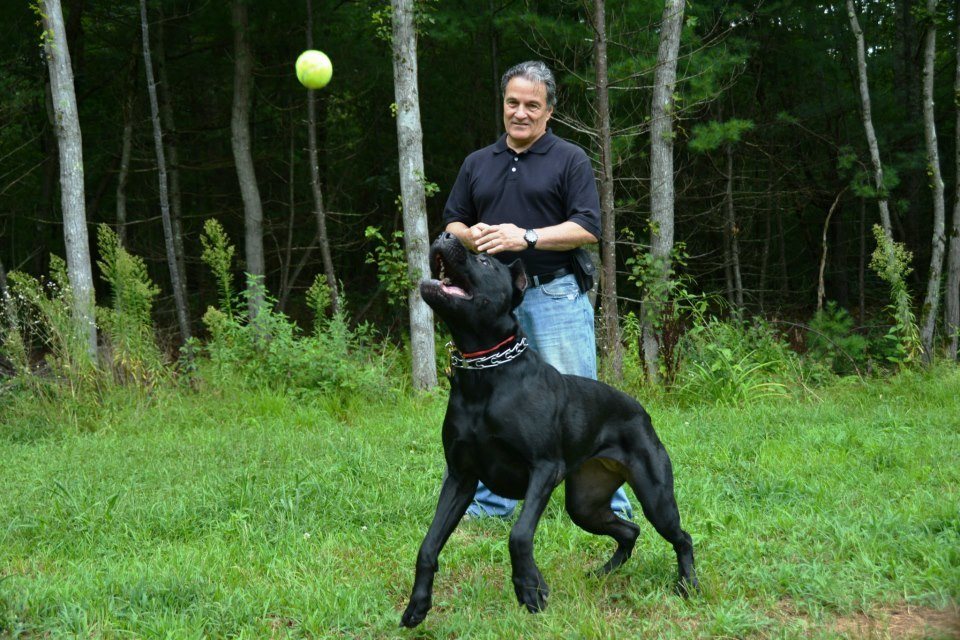
A dog is “in drive” when doing activities that they enjoy.
If you instill the use of voice commands while the dog is “in drive”, followed by rewarding the dog with food, you will begin to develop voice control over the dog. Now, your dog will be more likely to listen to you instead of chasing that small animal running into the road when her (prey) drive is triggered.
Of course them chasing a small animal is one of the harder things have control over, but if you do proper 'drive capping work” while the dog is young you will be able to have some level of control over the dog's behavior in most situations as the dog matures.
The Often Overlooked Positives Of Having a High-Drive Dog
When trained the right way, dogs with high drives are often easier to train to higher levels. That's why you see these "high drive dog breeds" doing more complex working tasks. In addition, a dog's high drive can aid in conditioning if a dog has weak nerve.
If a weaker-nerved dog's drive is high enough, the nervous behavior can be mitigated by triggering the dog to “enter into a drive” (one it is happy in).
For example, you're able to offer an object or scenario as a reward when the dog is scared, that has the ability to remove the dog from it’s fearful state. This is the most effective bargaining chip you can have when trying to get performance from a scared dog.
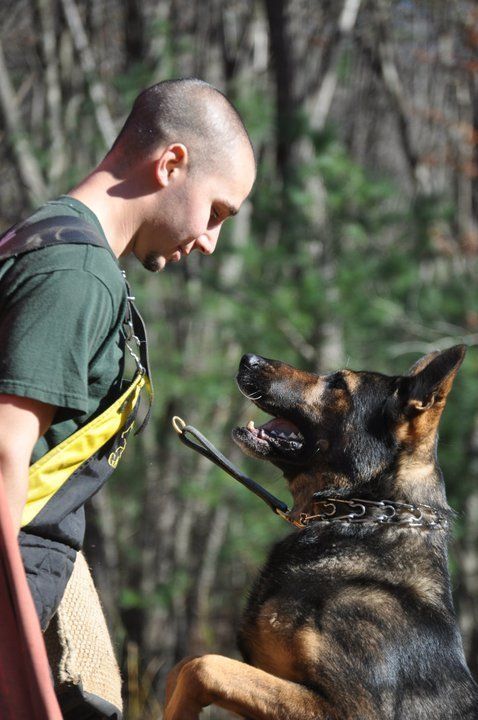
On the other hand, if a dog has weak nerves and weak drive, it becomes hard to get them to do a behavior they're happy doing.
Another benefit of a dog with high-drive is the drive can be manipulated up and down with intelligent training. Because the dog's drive is so high, you can train it to channel the drive towards doing what you want it to do. This is what makes these dogs desirable in search and rescue, therapy, guide work, and police work.
Does High-Drive Mean High Energy?
Drive should never be used as a synonym for energy level because enerygy level has nothing to do with drive. No animal has hidden energy stores waiting to be tapped into when a drive is triggered.
However, dogs with high drives can flood with hormones and that trigger animal responses and faster heart rates and better performance (i.e. adrenaline).
But it's important to note that this does not speak to the overall energy level your dog has. Physical energy is a matter of nutrition and physical conditioning rather than drive.
The reason dogs with high prey drive typically have lots of energy is because their predecessors needed the energy to complete the tasks they were bred for.
The more a dog runs, the fitter it gets. And the fitter it gets, the more it needs to run to maintain the muscle. If you keep this in mind as a "high-drive dog" owner, you'll have a much easier time living the life you want with your dog.
It's possible to have a high-drive dog with low energy:
You can curtail the chasing of things by intelligent puppy/dog management, games, and various training scenarios.
Even better, you can put the drive and energy to a good use that requires the dog to think. Mental exercise tires out a dog just as much, if not more in some cases, than physical exercise.
The Easiest Way to Understand Different Types of Drives in Dogs
The internet is filled with 1000’s of explanations for drives. And the more you read, the more confusing these explanations can get.
The easiest way to understand different drive types in dogs is to break them up as “life drives.” These are the drives needed to be a living animal.
Sub-categories do exist, but all the other drives are a combination of these "life drives."
The most important drive categories are:
- Social drive
- Prey drive
- Defensive drive

What Is Social Drive?
The social drive of a dog impacts its desire to have contact with other animals.
As you can imagine, it's social drive that impacts play drive, rank drive, pack drive, and sex drives. Social drive is also a small factor in breed-specific drives like "herding drive" and "retrieving drive", but prey drive plays a bigger role.
What Is Prey Drive?
The prey drive of a dog is it’s desire to chase down and kill prey.
Subsets of prey drive include hunt drive, herding drive, retrieving drive, and play drive.
Prey drive often gives 'high-drive dogs' a bad rap because it's misunderstood. High prey drive can be one of our greatest allies when training a dog. It can also be one of our biggest obstacles.
How High Drives Can Be Your Ally In Dog Training
If you can teach a dog to channel her prey drive into chasing and finding a favorite toy on command, you have an invaluable tool that becomes your training aid through the dog’s life.
How High Drive Can Be Your Enemy In Dog Training
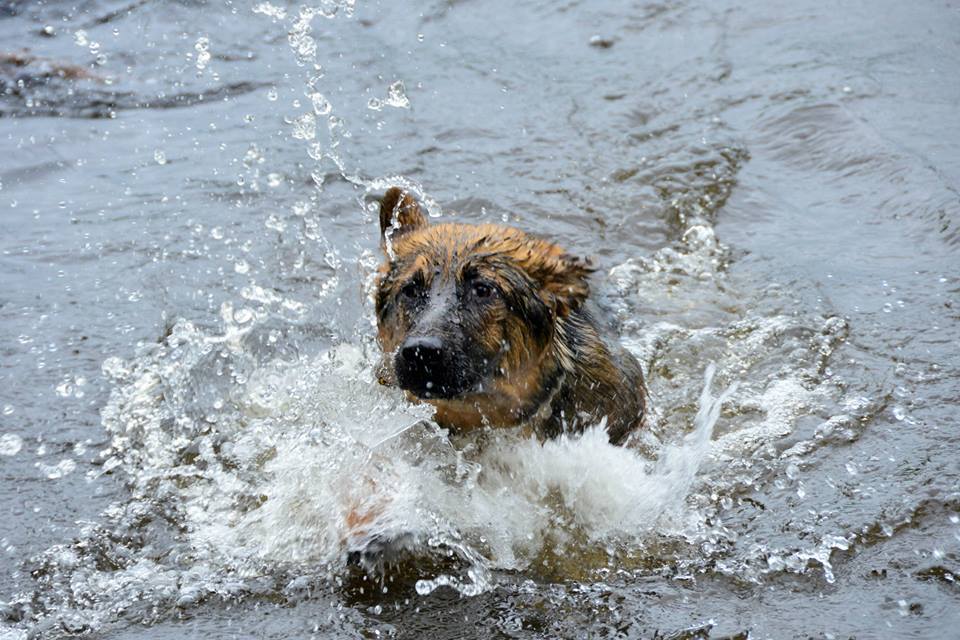
If your dog’s drive for chasing small living animals is her strongest drive, training becomes much more difficult. Here, you must work to raise one drive and lower another similar drive in order to get the dog to obey your commands. This is difficult, but not impossible.
If you feel like you're in this boat now, I suggest consulting with an expert dog trainer in your area (ps. if you need help selecting a reputable dog trainer, please don't hesitate to contact me. I'm more than happy to help!)
What Is Defensive Drive?
Defensive drive is the aggression and fear responses in a dog.
Defensive drive contributes to 'fight or flight' and self preservation. It's one of the dog's strongest instincts yet the drive that confuses people and gets German Shepherds in trouble most.
A dog that's running for it’s life is using the same part of it’s brain as a dog fighting for it’s life. The same hormones are pumped into the brain in both cases, which means that these two responses are biologically rooted in the same place.
It's the classic 'fight or flight, but because dogs learn in different ways than humans, their ability to distinguish whether to activate fight or flight is more difficult.
Because of this, it's important to understand defensive drive if you want to understand dog behavior and temperament.
Why Defensive Drive Has Gotten German Shepherds In Trouble
Because backyard breeders mistakenly characterize a dog that's aggressive in strange situations as a dog with a "strong protective instinct" or strong "defensive drive."
It's not necessarily the fault of these breeders to think this way. They're just uneducated.. but they're also 100% wrong.
When a dog is overly aggressive in unfamiliar situations, it doesn't have strong protective instincts, it has weak nerves + low thresholds.
Strong-nerved, well-bred, and well-trained dogs with good drives and appropriate thresholds will respond with aggression only when a situation calls for it (or in the case of great training, when the handler calls for it).
When breeding dogs that harbor strong defensive instincts we must be careful to account for nerves and thresholds as well as drives. Not doing so is detrimental to the breed.
Breeding solely for high drives without first taking nerves and thresholds into account damages the German Shepherd breed. These practices will continue to get the German Shepherd into trouble.
Thresholds; the Last Important Part of German Shepherd Temperament
What are thresholds?
Thresholds are the point in which a dog enters or exits any given drive.
It's important to understand that thresholds in general are an abstract idea. Any given threshold is not static, they change given the dog's environment.
Here are a real life examples that will help you understand thresholds:
Example #1: Why won't my dog play fetch with me in a new place?
You have a great idea... let's go to the old lot across town and play fetch with the puppy!
So you get ready, drive to the field, throw the ball your dog normally loves, and...
Nothing happens.
Why won't your dog play fetch with you at this new place?
Answer:
The confusion and excitement of a new environment are more arousing to her than playing with the ball.
What does this mean about her thresholds at this moment?
Her play drive thresholds are higher because she's distracted. It takes more to get her into play drive because of the external factors.
If you were playing fetch in the backyard where the pup normally plays, she wouldn’t be as aroused by the environment because she's used to it. It would be easier to get her to chase the ball, which means her play drive thresholds are lower.
The same concept is true on the other side of the coin.
Let's stay in your backyard for the next example...
Example #2: Why does my dog get distracted around other dogs?
Your in your backyard playing with the pup.
You throw the ball, she chases it, then brings it back to you.
But then your friend comes over for coffee and brings her two dogs.
Your pup goes crazy with excitement and starts playing with the other dogs.
While this is going on, you tell your friend about how great your pup is at playing fetch and decide to give a demonstration.
So you go over to your dog, throw the ball, and she ignores it.
What the heck just happened?!
Why won't your dog play fetch in your backyard now, when she usually can't get enough of it?
Answer:
Her 'play drive thresholds' with regards to the ball are lower in this moment because of the environment. Her social drive is more powerful at this moment. This makes her want to play with the other dogs instead of chasing after the ball.
If she had instead ignored the other dogs to chase the ball, her play drive in that moment could be described as higher than her social drive.
Again, it's critical to understand that thresholds in dogs are constantly changing due to external environmental factors.
If you can keep this in mind, it becomes much easier to understand the causality of your dog’s behavior. And if you can understand the causality of her behavior, training becomes easier too.
This philosophy is even more important in the German Shepherd world because the more German Shepherds are bred for looks over utility, the poorer their temperaments will be...
...and it's dogs with poor temperament that make the news and give the entire breed a bad name.
How The Ability To Learn Affects The Temperament Of Dogs And Humans
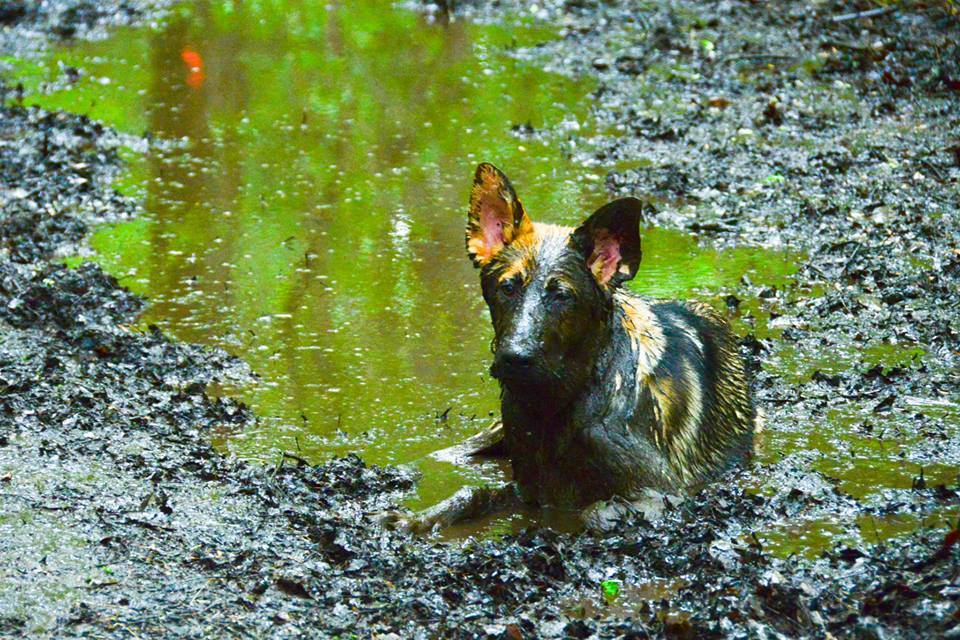
Humans have thresholds too, but the difference between us and dogs in regard to changing learning and developing our temperament is huge.
The reason for this comes down to exactly how we learn and process information.
A vast difference exists between humans and dogs when it comes to nerves, drives, and thresholds because humans can explain, imagine and recall events. We can learn through language, through story, and through the experiences of other, while dogs cannot.
Dogs are get all their information from the physical world. Because of this, their reactions to specific environments are uniquely their own
No dog's nerves, drives, thresholds, or overall temperament is the same as another dog's.
With all the advantages we have over dogs when it comes to learning, we have an increased responsibility to do as much as we can to understand how their mind works if we hope to happily coexist.
How you can influence your dog's temperament
As mentioned throughout this article, puppies learn through experience.
They don’t inherit abilities that were taught to their parents by humans and adult dogs can't articulate these learnt abilities to their puppies.
Instead, dogs inherit genes. And the genes are what give a puppy the ability to learn.
For example:
If a mother's ability to learn is high, this gene will be passed down to her puppy.
And if a mother's ability to learn is low, that gene would be passed down to the puppy too.
The ability to learn is passed from parent to puppy, but as an owner you must put your puppy in a wide variety of different environments so they can learn as much as possible and develop stable temperament.
Influencing your dogs temperament is as simple as varying their environment and life experiences as much as possible. If you use this idea as your framework when raising your puppy, you'll be ahead of the game.
How Humans Can Affect An Entire Breed's Temperament
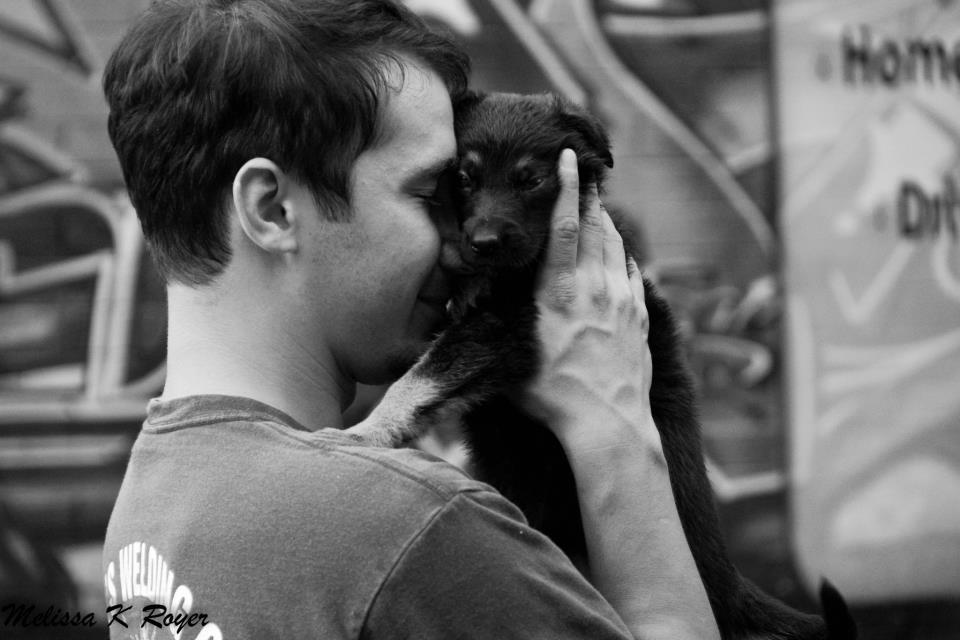
We cannot allow genetics to be put in a place of insignificance when it comes to breeding animals. Selectively bred dogs have been an aid to humanity over all time and live in the vast majority of cultures and climates.
As humans, we owe it to them to understand their basic instincts so we can help them adapt to our world. This means understanding the functions of their temperament and how the role of environment comes into play in every case.
Here's how we can do it together:
First, we need to understand how a dog’s genes effect its behavior, temperament, and personality. We don't all need to be experts, but every dog owner should have a general overview.
Next, we must take the breeding of healthy, happy dogs with wonderful, useful dispositions much more seriously. This means stopping the breeding of certain dogs because they have “desirable” physical traits.
This is the only way we can continue to improve the state of the dog world and produce dogs with good temperament.
And when it comes to breeding German Shepherds, these goals are even more important. The more German Shepherds are bred for looks over utility, the poorer their temperaments will become.
And it's German Shepherds with poor temperament that give the public confusion over the breed's true temperament, personality, and behavior.
People hear a bad story about the breed and automatically assume every dog in that breed is the same.
How You And Your Dog Can Live A Happier Life Together
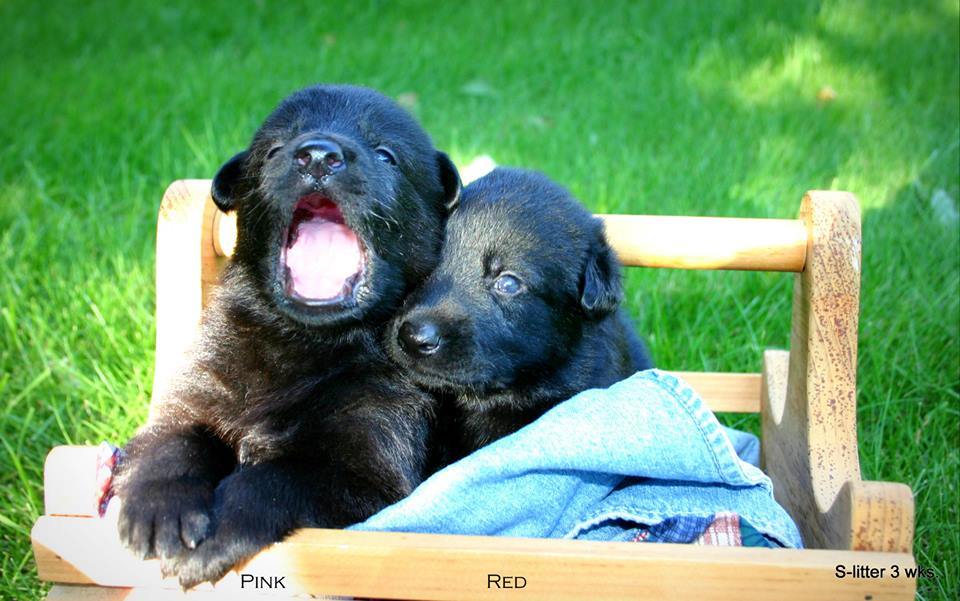
Since no dog is the same, having cut and dry descriptions of an entire breed is impossible.
It's also dangerous, because these generic descriptions can be used to incorrectly explain a dogs behavior.
For example:
“Oh, she's trying to chase the neighbor's cat because she's aggressive”
After reading this article, you know why this is bad...
The statement doesn't uncover the root of the problem (which is a combination of drives and thresholds). The person describing this dog isn't a bad person, they just don't understand the science behind their dog's behavior.
To become a better dog owner, you must first understand the science behind temperament. Once you do that, you'll have the knowledge base to raise your puppy in a calculated way.
As a result, you'll be able to play your part in making the dog world a better place. And you and your dog will be able to live a happier life together.
Hey there!
We would love to hear your opinion!
Share this guide with your Facebook friends, or leave a comment below 🙂

